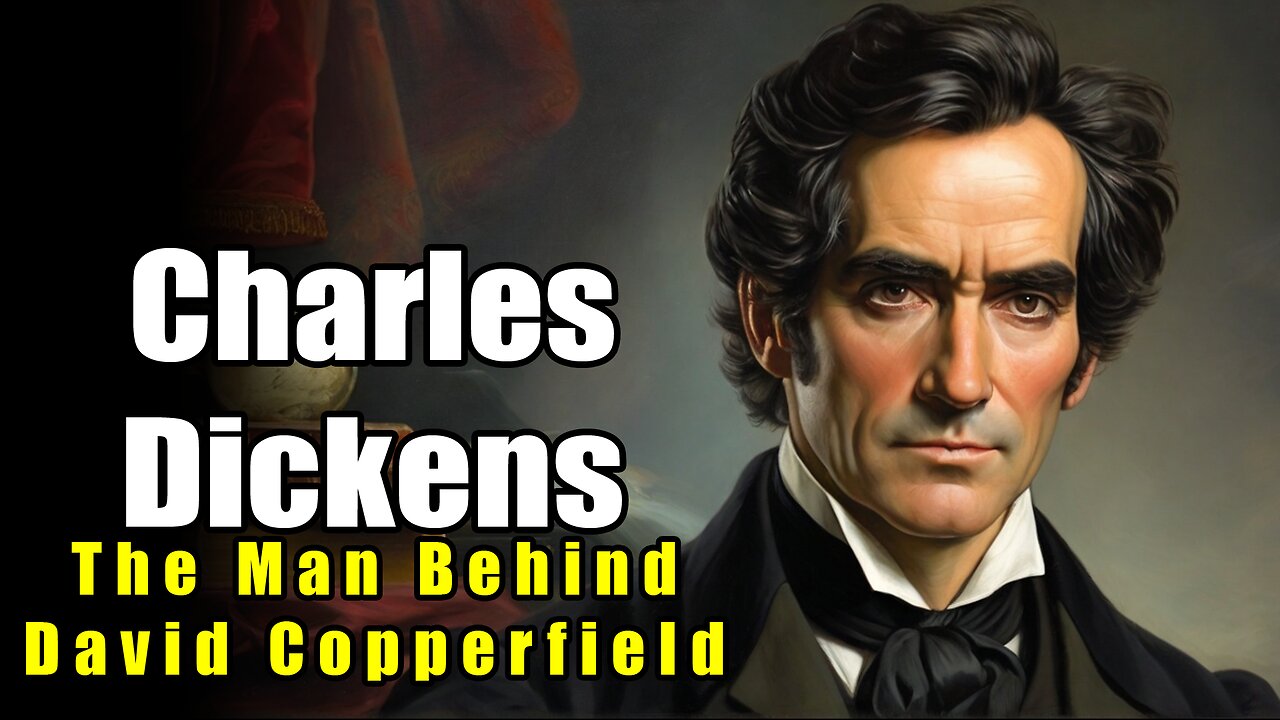Premium Only Content

Charles Dickens: The Man Behind David Copperfield (1812 - 1870)
Charles Dickens (1812–1870) was an English writer and social critic who remains one of the most celebrated novelists of the Victorian era. His works, known for their vivid characters, intricate plots, and social commentary, have left a profound impact on literature. Here's an overview of Charles Dickens's life and his notable contributions:
Early Life and Education:
Birth and Childhood:
Charles John Huffam Dickens was born on February 7, 1812, in Portsmouth, England.
He was the second of eight children in a middle-class family.
Early Years:
Dickens's early years were marked by financial struggles and family instability, which deeply influenced his writing.
Education and Work:
Dickens left school at a young age and worked in a factory while also studying shorthand and working as a law clerk.
Literary Career:
Journalism and Writing:
Dickens began his writing career as a journalist, contributing sketches and articles to various newspapers and magazines.
The Pickwick Papers (1836):
Dickens gained widespread recognition with the publication of his first novel, "The Pickwick Papers," serialized between 1836 and 1837.
Successive Novels:
Dickens went on to write numerous novels, including "Oliver Twist" (1837-1839), "Nicholas Nickleby" (1838-1839), "David Copperfield" (1849-1850), "Bleak House" (1852-1853), "Great Expectations" (1860-1861), and "A Tale of Two Cities" (1859), among others.
Social Commentary and Themes:
Social Criticism:
Dickens's novels often critiqued the social injustices and inequalities of Victorian society, addressing issues such as poverty, child labor, and the plight of the working class.
Characterization:
Dickens's characters are vividly drawn and memorable, representing various social classes and embodying both virtue and vice.
Humor and Pathos:
His writing is characterized by a blend of humor and pathos, with moments of satire and sentimentality.
Philanthropy and Activism:
Reform Efforts:
Dickens was actively involved in philanthropic endeavors and supported various social reform movements, including education and prison reform.
Reading Tours:
He undertook reading tours, delivering public readings of his works to audiences in England and the United States.
Later Years and Legacy:
Personal Life:
Dickens experienced personal hardships, including marital difficulties and health issues, but continued to write prolifically.
Death:
Charles Dickens passed away on June 9, 1870, following a stroke. He was buried in Westminster Abbey, London.
Literary Legacy:
Dickens's novels have endured as classics of English literature, beloved for their rich storytelling, memorable characters, and timeless themes.
Influence:
His influence extends beyond literature, shaping popular culture and inspiring adaptations in film, television, and theater.
Charles Dickens's literary legacy continues to resonate with readers worldwide, captivating audiences with his timeless stories and incisive social commentary. He remains a towering figure in the literary canon, celebrated for his enduring contributions to literature and social reform.
-
 1:52:42
1:52:42
Kim Iversen
8 hours ago💰 CHA-CHING! 💰 Trump Unveils Big Money Plans For Gaza AND America
51.1K114 -
 1:05:28
1:05:28
Flyover Conservatives
21 hours agoUkraine’s Dirty Secret: The Christian Persecution No One Wants to Talk About - Alex Newman | FOC Show
47.5K19 -
 2:00:20
2:00:20
Glenn Greenwald
13 hours agoThe View from Moscow: Key Russian Analyst Aleksandr Dugin on Trump, Ukraine, Russia, and Globalism | SYSTEM UPDATE #414
123K64 -
 1:10:55
1:10:55
Donald Trump Jr.
10 hours agoBREAKING NEWS: My Father Revokes Biden-Maduro Oil License, LIVE with Maria Corina Machado | Triggered Ep.220
197K194 -
 1:25:29
1:25:29
Sarah Westall
9 hours agoX-Files True History, Project Blue Beam, Cabal Faction War w/ Former FBI Agent John DeSouza
80.5K15 -
 7:03:49
7:03:49
Dr Disrespect
16 hours ago🔴LIVE - DR DISRESPECT - NEW PC VS. DELTA FORCE - MAX SETTINGS
167K27 -
 49:04
49:04
Lights, Camera, Barstool
1 day agoIs The Monkey The Worst Movie Of The Year?? + Amazon Gets Bond
72.5K4 -
 24:19
24:19
Adam Carolla
1 day agoDiddy’s Legal Drama Escalates, Smuggler Caught Hiding WHAT? + Philly Eagles & The White House #news
126K19 -
 10:12
10:12
Mike Rowe
2 days agoClint Hill: What A Man. What A Life. | The Way I Heard It with Mike Rowe
125K17 -
 1:31:52
1:31:52
Redacted News
12 hours agoBOMBSHELL! This is war! FBI whistleblowers reveal Epstein files being destroyed? | Redacted News
195K370